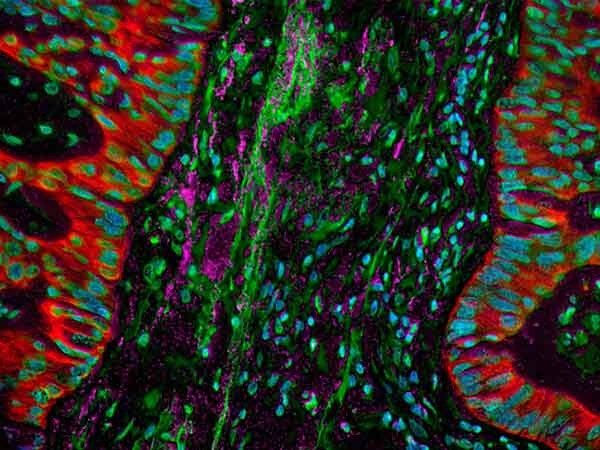
FDA Expands Approval of Ceritinib for ALK-Positive Non-Small Cell Lung Cancer
June 27, 2017, by NCI Staff
On May 26, the Food and Drug Administration (FDA) approved ceritinib (Zykadia®) for patients with previously untreated metastatic non-small cell lung cancer (NSCLC) that has a mutation in the ALKgene. Ceritinib is a targeted therapy that blocks the action of mutated ALK proteins.
Approximately 5% of patients with NSCLC have cancer-causing ALK mutations.
Until now, crizotinib (Xalkori®) was the only ALK inhibitor approved as first-line therapy for patients with ALK-positive NSCLC. Although crizotinib can be highly effective, patients usually stop responding to the drug after about a year of treatment.
In 2014, FDA granted accelerated approval to ceritinib as a second-line therapy for patients with metastatic ALK-positive NSCLC whose disease had gotten worse despite previous treatment with crizotinib. Two other “next-generation” ALK inhibitors, alectinib (Alecensa®) and brigatinib (AlunbrigTM), later received FDA approval as second-line treatments.
In addition to being effective in the majority of patients who are resistant to crizotinib, these next-generation inhibitors are also better than crizotinib at crossing the blood–brain barrier, meaning they may be more effective against lung tumors that have spread to the brain.
The most recent approval of ceritinib “reflects the start of a new battleground as next-generation drugs move into the first-line setting,” said David Ross Camidge, M.D., Ph.D., director of thoracic oncology at the University of Colorado. “The logic is maybe we don’t have to wait for someone to develop resistance or progression in the brain. Now we’re trying to use these next-generation ALK inhibitors up front.”
The new approval is based on results from a clinical study of 376 patients with advanced or metastatic ALK-positive NSCLC (as identified with an FDA-approved test) who had not received previous treatment. Participants were randomly assigned to receive ceritinib or chemotherapy.
Median progression-free survival was 16.6 months in the ceritinib group and 8.1 months in the chemotherapy group. The investigators observed a measurable change in tumor size, called an objective response, in 73% of patients in the ceritinib group and 27% of patients in the chemotherapy group. They also found that patients in the ceritinib group responded more quickly to treatment and that their responses lasted longer than those of patients in the chemotherapy group.
More patients treated with ceritinib experienced side effects, including severe side effects. The most common low-grade effects with ceritinib were diarrhea, nausea, and vomiting, and the most common high-grade effect was the elevation of certain liver enzymes. Because of side effects, the majority of patients who received ceritinib had to have their treatment temporarily halted or the dose of the drug reduced, and 12% of patients stopped treatment altogether.
Novartis, the manufacturer of ceritinib, is studying whether taking a lower dose of ceritinib with food may improve patients' ability to tolerate the drug.
Lung cancer researchers expect that alectinib and brigatinib also will eventually be approved by the FDA as first-line treatments for patients with ALK-positive NSCLC. A recent clinical trial, in fact, showed that alectinib was superior to crizotinib as first-line therapy (see sidebar). And even though it’s not yet FDA approved as a first-line treatment, on June 22 the National Comprehensive Cancer Network changed its treatment guidelines to add alectinib as the preferred first-line ALK inhibitor option over both crizotinib and ceritinib.
Alectinib More Effective than Crizotinib as First-Line Therapy
Alectinib substantially improves progression-free survival in patients with newly diagnosed ALK-positive advanced NSCLC compared with crizotinib, researchers reported earlier this month at the American Society of Clinical Oncology (ASCO) annual meeting in Chicago.
In a phase III clinical trial, patients who were randomly assigned to receive alectinib had a median progression-free survival of 26 months, compared with 10 months for those who received crizotinib. Fewer patients in the alectinib group (12%) had cancer metastases in the brain or spinal cord develop or get worse during treatment than those in the crizotinib group (45%). The results were also published in the New England Journal of Medicine.
The trial results “establish alectinib as the standard of care for advanced, previously untreated ALK-positive NSCLC,” said Alice Shaw, M.D., Ph.D., of Massachusetts General Hospital, a trial investigator who presented the results at the ASCO meeting.
A similar number of patients in both groups experienced adverse events. Gastrointestinal side effects, including diarrhea, nausea, vomiting, and constipation, were less severe in the alectinib group than in the crizotinib group.
The “dramatic difference in efficacy” and “improved tolerability” of alectinib distinguishes it from other ALK inhibitors, John Heymach, M.D., Ph.D., chair of the department of thoracic/head and neck medical oncology at the University of Texas MD Anderson Cancer Center, said during a press briefing on the trial findings.
In addition, ongoing trials are comparing crizotinib with different next-generation ALK inhibitors, including brigatinib and two experimental drugs, ensartinib and lorlatinib.
With several of these drugs already showing potentially even greater efficacy than alectinib, Dr. Camidge explained, there is considerable excitement about whether first-line therapy options will continue to improve in the future.

































No hay comentarios:
Publicar un comentario